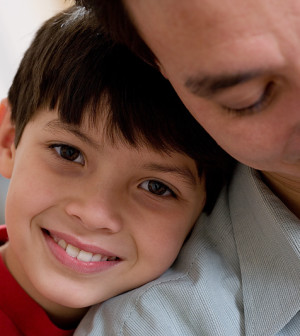- Could Your Grocery Store Meat Be Causing Recurring UTIs?
- Are You Making This Expensive Thermostat Error This Winter?
- Recognizing the Signs of Hypothyroidism
- 10 Strategies to Overcome Insomnia
- Could Artificial Sweeteners Be Aging the Brain Faster?
- Techniques for Soothing Your Nervous System
- Does the Water in Your House Smell Funny? Here’s Why
- Can a Daily Dose of Apple Cider Vinegar Actually Aid Weight Loss?
- 6 Health Beverages That Can Actually Spike Your Blood Sugar
- Treatment Options for Social Anxiety Disorder
Child Health Improves When Caregivers Get One-on-One Help

The health of children in poor families improves when their caregivers receive one-on-one assistance with social needs such as lack of food and shelter, a new study finds.
The research included 872 families who were provided with a “navigator” to help them tackle assorted social needs. Another 937 low-income families were in a control group that received minimal help.
The children were primarily Hispanic and black. Their average age was 5. Caregivers were mostly women and family incomes were below the federal poverty level, the study authors said.
The caregivers were asked about their families’ 14 types of social needs, including trouble affording food and utilities, unemployment, not having a place to live, and living in an unhealthy environment.
In the intervention group, navigators provided caregivers with information about resources such as child care, help paying utility bills, transportation and shelter arrangements. The caregivers in the control group received written information about resources, but no help from a navigator and no follow-up.
At the start of the study, the number of social needs reported by caregivers ranged from zero to 11 out of 14, with an average of about 3. Most caregivers said their kids’ health was very good or excellent.
Four months into the study, the number of social needs reported by caregivers in the intervention group decreased more than among caregivers in the control group.
Also, caregivers in the intervention group reported more improvement in overall child health status, the study showed.
The study was published online Sept. 6 in the journal JAMA Pediatrics.
“These findings extend previous work documenting the associations between social adversities experienced in childhood and health outcomes, as well as on process outcomes related to social interventions,” Dr. Laura Gottlieb, from the University of California, San Francisco, and study co-authors wrote in a journal news release.
They said more work needed to be done in this area, but added that the “the finding that the low-intensity interventions undertaken in this study can affect child health outcomes [shows] the value of such programs.”
More information
The American Academy of Pediatrics offers resources on children and healthy living.
Source: HealthDay
Copyright © 2026 HealthDay. All rights reserved.










